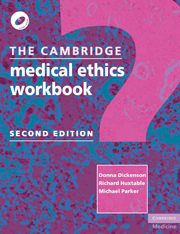Book contents
- Frontmatter
- Contents
- List of cases
- List of papers
- Preface to the second edition
- Preface to the first edition
- Cases in medical ethics and law: an interactive tutorial
- 1 Death and dying: decisions at the end of life
- 2 Reproduction: decisions at the start of life
- 3 Genetics: information, access and ownership
- 4 Medical research: participation and protection
- 5 Mental health: consent, competence and caring
- 6 Long-term care: autonomy, ageing and dependence
- 7 Children and young people: conflicting responsibilities
- 8 Resource allocation: justice, markets and rationing
- 9 Thinking about ethics: autonomy and patient choice
- Appendix 1 Study guide for teachers
- Appendix 2 Using keywords to explore this book
- Bibliography
- Index
9 - Thinking about ethics: autonomy and patient choice
- Frontmatter
- Contents
- List of cases
- List of papers
- Preface to the second edition
- Preface to the first edition
- Cases in medical ethics and law: an interactive tutorial
- 1 Death and dying: decisions at the end of life
- 2 Reproduction: decisions at the start of life
- 3 Genetics: information, access and ownership
- 4 Medical research: participation and protection
- 5 Mental health: consent, competence and caring
- 6 Long-term care: autonomy, ageing and dependence
- 7 Children and young people: conflicting responsibilities
- 8 Resource allocation: justice, markets and rationing
- 9 Thinking about ethics: autonomy and patient choice
- Appendix 1 Study guide for teachers
- Appendix 2 Using keywords to explore this book
- Bibliography
- Index
Summary
Introduction
Human rights and the associated emphasis on liberty or freedom belong to a well-established tradition of ethical reasoning. Their origins can perhaps be traced to the recognition by the Stoic philosophers in Ancient Greece of the possibility that the actual laws and conventional practices in a particular community might be seen to be unjust when contrasted with a ‘natural law’ (Almond, 1993). For this reason the concept of ‘universal human rights’ which grew out of the ‘natural law’ tradition has often appealed to those who have felt themselves to be vulnerable or to be oppressed by the powerful. For the appeal to a concept of universal human rights transcending any particular community and its laws makes it possible to call for the upholding of the rights of individuals against their community and against such laws, and in recent years the concept of universal human rights has come to play an important role. It helps us to recognize and express the importance of the protection of the weak and vulnerable.
In medicine this has tended to be expressed as the belief that the protection of vulnerable patients and the practice of ethical medicine can best be guaranteed in a context of patient-centred medicine, that is, in medicine which places a very high value on respect for autonomy and patient choice. An emphasis on patient-centredness means that in cases where practitioners wish to override the expressed wishes of a patient the burden of justification lies with the practitioner.
- Type
- Chapter
- Information
- The Cambridge Medical Ethics Workbook , pp. 191 - 214Publisher: Cambridge University PressPrint publication year: 2010



